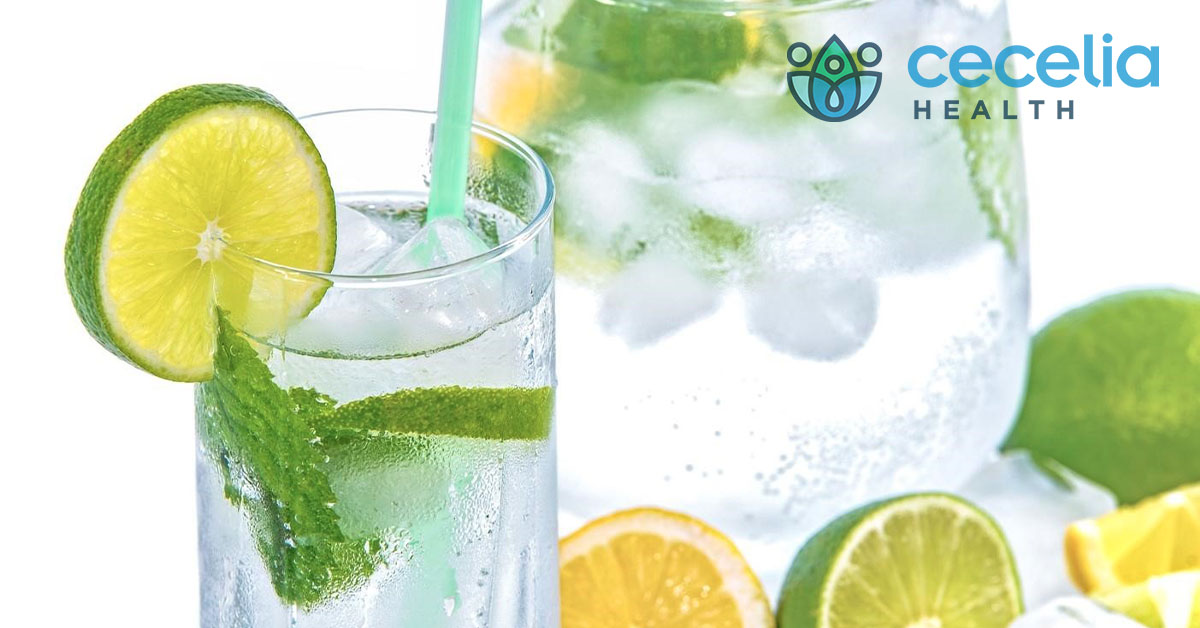A balanced diet is one of the main lifestyle components for diabetes management, so focusing on the types of foods and portions you eat is essential. However, paying attention to what fluids you are consuming with and between meals is just as important. Making good beverage choices can help you stay hydrated and energized, while also keeping your weight and blood sugars in check. Let’s look at some healthy options to drink daily:
1. Water- first and foremost
You may already know that it’s important to drink plenty of fluids throughout the day, but you also need to pay attention to the quality of your fluids, not just the quantity. Water is your best bet because it hydrates you simply, without anything else, namely added calories or sugar.
Try and focus on consuming water as your main source of hydration to keep things as simple as possible!
Did you know that our bodies are largely made up of water, about 50-70 percent of our body weight in fact! Water is required by our body’s cells and organs to function to:
- deliver nutrients throughout the body and remove waste,
- keep our temperature normal,
- protect and cushion our joints, and
- maintain our blood volume, which affects blood pressure and heart function.
Also, filling up of fluids pre-meals has shown to be an effective weight loss technique and helps with hunger. Recent research has shown that drinking about 16 ounces or 2 cups of water 30 minutes before meals can reduce excess hunger and lead to more weight loss. And of course, drinking enough water helps prevent dehydration that can lead to low energy.
How much water do you need?
Studies have shown mixed results about exactly how much water needs to be consumed daily. Trying to aim for 6 to 8 cups a day is a good place to start, unless you have a medical condition that restricts fluids. You may require more water with heavy exercise, hotter temperatures and in times of illness.
Tips To Drink More Water
To drink plenty of water try these tips:
- Take a water reusable bottle with you wherever you go, set one on your desk at work, or next to you at home.
- Sip water before every meal you eat! Start out by consuming a glass of water before you even prepare your meal, so that you will already have consumed your fluids and won’t forget as you start nibbling.
- Set an alarm every hour reminding you to take a sip if you find yourself forgetting to drink frequently enough.
- Add sliced lemon, lime, oranges or cucumbers to throw in a little flavor.
2. What about other fluids besides water?
Additional healthy beverages that can help you meet your fluid needs include:
- Tea- try exploring the world of tea! From fruity to spicy, there’s a whole variety of calorie-free, delicious teas to choose from. Green tea, in particular, has shown to potentially aid in blood sugar control because it contains compounds that help the uptake of glucose into the skeletal muscle, reducing it in the blood. Many teas have also shown to help decrease risk of inflammation and chronic diseases.
- Black coffee- enjoy caffeinated for a low calorie pick me up or decaffeinated if you want a tasty beverage without the caffeine.
- Sparkling water – bubbly and crisp, carbonated water is refreshing and even filling! And you can add a bit of pizzazz via a small splash of juice, or some fresh herbs like mint. There are now many sparkling waters on the market that come in a variety of flavors, and are both sugar and calorie free- just be sure to double check labels.
- Low fat milk/milk alternatives- in addition to providing needed fluids, milk contains protein, calcium and vitamin D for bone and muscle health. You can also choose unsweetened milk alternatives like soy or almond milk that are fortified with calcium and vitamin D.
- Vegetable juice- choosing low sodium tomato juice or green vegetable-based juices (without added fruits) are great savory low sugar options to add some refreshment and a vegetable serving into your day.
3. What beverages should you avoid?
Try to minimize consuming the following beverages.
- Sodas
- Fruit punch
- Lemonade
- Sweet tea
- Sports drinks
- Fancy sweetened coffee or tea drinks (eg. mochachino, bubble tea)
They contain extra calories, sugar and additives like artificial colors and flavorings, which can all lead to elevations in blood sugars, weight and increased inflammation in the body.
4. What about diet sodas and other artificially sweetened drinks?
Consuming diet drinks is an alternative way to cut carbohydrates, added sugars and calories. However, there is some preliminary research suggesting artificially sweetened beverages may have less favorable effects on health such as changes in perception of sweetness and taste , and metabolism and intestinal bacteria composition. This can lead to cravings, increased food intake, and potential weight gain. Your best bet is to consume these beverages in moderation.
